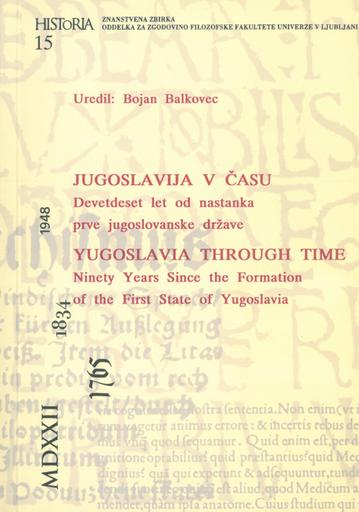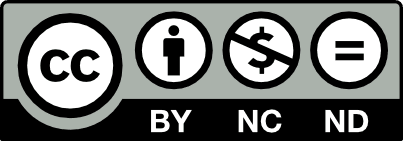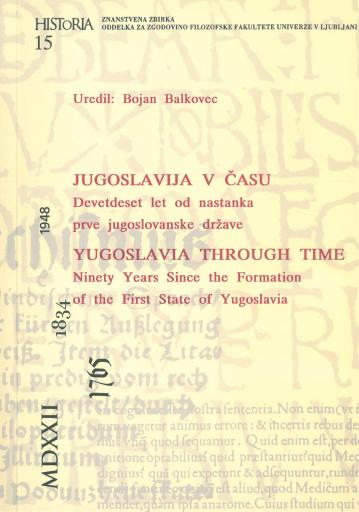
/
Literature
/
Monographs
Slovenian politics and introduction of the pulpit paragraf in the first state of Yugoslavia


This work by Jurij Perovšek is licensed under Creative Commons Attribution-NonCommercial-NoDerivs 4.0 International
Files (1)

Description
After the First State of Yugoslavia was established, the question of religious practice and its role in society became the subject of a specific political debate when, in the spring of 1921, the Kingdom o f SHS Constituent Assembly discussed, among other things, the so-called Pupil Paragraph, i.e. proposal for a constitutional provision according to which religious representatives should not exploit their ecclesiastical service and cleric duties for political purposes. Slovene political parties expressed their views about this proposal in line with their fundamental conceptual and political grounds. The Slovenian Catholic People's Party (SLS) strongly opposed the introduction of Pulpit Paragraph. Such Paragraph would have interfered with the absolute right of the Church to govern its internal affairs independently. The SLS representatives also pointed out that issues relating to the Pulpit Paragraph had already been regulated by the encyclical of Benedict XV, entitled Humani generis redemptionem (1917), which prohibited priests to take part in any political activities in performing their duties. However, the two liberal parties - Yugoslav Democratic Party and the Independent Farmers' Party, which otherwise recognised religion as an integral part of human sentiments, spoke strongly in favour of the Pulpit Paragraph. In their view, exploiting religion for political purposes was something that would have to be prevented. The liberal Socialist People's Party was also against the exploiting religion for political purposes. For allthat in their opinion, the Pulpit Paragraph would not solve the above-mentioned issues and would only encourage cultural dispute. Likewise, the Pulpit Paragraph was the subject of different discussions in Marxist circles, which defended the concept of disestablishment of the church. The Yugoslav Social-Democratic Party supported the idea of introducing the Pulpit Paragraph, which was based on their belief that religion should not interfere with politics, whereas Slovenian communists expressed no opinion about its introduction at all.The Constituent Assembly supported the proposal of introducing the Pulpit Paragraph. Afterwards, the Pulpit Paragraph was included in the Vidovdan Constitution adopted on 28 June1921, which created a new challenge for ideological confrontations in the Slovene political milieu- a challenge which survived different legal orders in Slovenia and is present even in the 21st century.
Metadata (13)
- identifierhttps://hdl.handle.net/11686/26873
- title
- Slovenska politika in uvedba kancelparagrafa v prvi jugoslovanski državi
- Slovenian politics and introduction of the pulpit paragraf in the first state of Yugoslavia
- creator
- Jurij Perovšek
- contributor
- Bojan Balkovec (ur.)
- subject
- politična zgodovina
- Jugoslavija
- Kraljevina SHS
- cerkev
- kancel paragraf
- Yugoslavia
- Kingdom of SCS
- political history
- religious practice
- Pupil Paragraph
- description
- Po oblikovanju prve jugoslovanske države je vprašanje vere in njene družbene vloge postalo predmet posebne politične obravnave, ko so v Ustavodajni skupščini Kraljevine SHS spomladi 1921 med drugim razpravljali tudi o t. i. kancelparagrafu, to je predlogu ustavnega določila, po katerem verski predstavniki svoje duhovniške službe in duhovniških nalog ne bi smeli izkoriščati v politične namene. Slovenske politične stranke so se o omenjenem predlogu opredelile skladno s svojimi temeljnim i idejnim i in političnim i izhodišči. Katoliška Slovenska ljudska stranka je uvedbi kancelparagrafa odločno nasprotovala. S tem bi namreč posegli v suvereno pravico Cerkve, da sama ureja svoje notranje zadeve. Predstavniki SLS so ob tem opozorili, daje problematiko kancelparagrafa uredila že enciklika Benedikta X V. Humani generis redemptionem (1917), ki duhovniku kot učitelju vere prepoveduje vso politiko. Nasprotno pa sta se liberalni Jugoslovanska demokratska stranka in Samostojna kmetijska stranka, k i sta sicer upoštevali vero kot sestavni del človekovega čustvovanja, odločno zavzeli za kancelparagraf. Izhajali sta namreč iz stališča, daje treba preprečiti izkoriščanje vere v politične namene. Temu je nasprotovala tudi liberalna Narodno socialistična stranka, ki pa je menila, da kancelparagraf ne more rešiti omenjenega vprašanja, kvečjemu lahko le pospeši kulturni boj. Tudi v marksističnem taboru, v katerem so zagovarjali ločitev cerkve in države, so vprašanje kancelparagrafa obravnavali različno. Jugoslovanska socialnodemokratska stranka ga je na podlagi stališča o nevmešavanju vere v politiko podprla, slovenske komuniste pa njegova uvedba ali ne, ni zanimala.Ustavodajna skupščina je predlog kancelparagrafa podprla. Kancelparagraf je bil nato vključen v Vidovdansko ustavo, sprejeto 28. junija 1921. S tem je bila opredeljena nova izzivna točka ideoloških soočanj v slovenski politiki, ki se je nato skozi različne pravne rede na Slovenskem ohranila do 21. stoletja.
- After the First State of Yugoslavia was established, the question of religious practice and its role in society became the subject of a specific political debate when, in the spring of 1921, the Kingdom o f SHS Constituent Assembly discussed, among other things, the so-called Pupil Paragraph, i.e. proposal for a constitutional provision according to which religious representatives should not exploit their ecclesiastical service and cleric duties for political purposes. Slovene political parties expressed their views about this proposal in line with their fundamental conceptual and political grounds. The Slovenian Catholic People's Party (SLS) strongly opposed the introduction of Pulpit Paragraph. Such Paragraph would have interfered with the absolute right of the Church to govern its internal affairs independently. The SLS representatives also pointed out that issues relating to the Pulpit Paragraph had already been regulated by the encyclical of Benedict XV, entitled Humani generis redemptionem (1917), which prohibited priests to take part in any political activities in performing their duties. However, the two liberal parties - Yugoslav Democratic Party and the Independent Farmers' Party, which otherwise recognised religion as an integral part of human sentiments, spoke strongly in favour of the Pulpit Paragraph. In their view, exploiting religion for political purposes was something that would have to be prevented. The liberal Socialist People's Party was also against the exploiting religion for political purposes. For allthat in their opinion, the Pulpit Paragraph would not solve the above-mentioned issues and would only encourage cultural dispute. Likewise, the Pulpit Paragraph was the subject of different discussions in Marxist circles, which defended the concept of disestablishment of the church. The Yugoslav Social-Democratic Party supported the idea of introducing the Pulpit Paragraph, which was based on their belief that religion should not interfere with politics, whereas Slovenian communists expressed no opinion about its introduction at all.The Constituent Assembly supported the proposal of introducing the Pulpit Paragraph. Afterwards, the Pulpit Paragraph was included in the Vidovdan Constitution adopted on 28 June1921, which created a new challenge for ideological confrontations in the Slovene political milieu- a challenge which survived different legal orders in Slovenia and is present even in the 21st century.
- publisher
- Oddelek za zgodovino Filozofske fakultete
- collection
- Historia: znanstvena zbirka Oddelka za zgodovino Filozofska fakultete v Ljubljani; 15
- date
- 2009
- type
- besedilo
- language
- Slovenščina
- isPartOf
- rights
- license: ccByNcNd
Citirano v (4)
| Tipologija | Avtor(ji) | Naslov | Kraj | Založba | Leto |
|---|---|---|---|---|---|
| 2.01 Znanstvena monografija | Mithans, Gašper | Jugoslovanski konkordat : pacem in discordia ali jugoslovanski "kulturkampf" | Ljubljana | Inštitut za novejšo zgodovino | 2017 |
| 1.01 Izvirni znanstveni članek | Perovšek, Jurij | Vprašanje idejnega, političnega, socialnega in narodnega sobivanja v liberalnipolitični misli in praksi med leti 1891-1941 | Ljubljana | 2011 | |
| 2.01 Znanstvena monografija | Perovšek, Jurij | V zaželjeni deželi : slovenska izkušnja s Kraljevino SHS/Jugoslavijo : 1918-1941 | Ljubljana | Inštitut za novejšo zgodovino | 2009 |
| 1.01 Izvirni znanstveni članek | Perovšek, Jurij | Država in demokracija v pogledih slovenske politike v Kraljevini Srbov, Hrvatov in Slovencev/Jugoslaviji (1918-1941) | Znanstvena založba Filozofske fakultete | 1991 |
Seznam literature v delu (14)
| Stran | Avtor | Naslov | Vir | Kraj | Založba | Leto |
|---|---|---|---|---|---|---|
| 106 | Perovšek, Jurij | Politične razmere na Slovenskem na prehodu iz 19. v 20. stoletje | Zbornik simpozija ob stoletnici začetka gradnje prve slovenske gimnazije | Ljubljana | 2002 | |
| 106 | Bergant, Zvonko | Kranjska med dvema Ivanoma: idejno-politično soočenje slovenskega političnega katolicizma in liberalizma.... | Ljubljana | 2004 | ||
| 107 | Perovšek, Jurij | Programi političnih strank organizacij in združenj na Slovenskem v času Kraljevine SHS (1918-1928) | Ljubljana | 1998 | ||
| 108 | Žečević, Momčilo | Slovenska ljudska stranka in jugoslovansko zedinjenje 1917- 1921 : od majniške deklaracije do vidovdanske ustave | Maribor | 1977 | ||
| 108 | Dolenc, Ervin | Kulturni boj: slovenske kulturna politika v Kraljevini SHS 1918-1929 | Ljubljana | 1996 | ||
| 108 | Godina Gantar, Irena | Prisilno izseljenstvo političnega agitatorja Frana Radeščka 1911-1921 | Prispevki za novejšo zgodovino | 2007 | ||
| 108 | Hohnjec, Josip | O ustavi naše države | Slovenci v desetletju 1918-1928 | Ljubljana | 1928 | |
| 108 | Lončar, Dragotin | Politično življenje Slovencev: od 4. januarja 1797 do 6. januarja 1919. leta | Ljubljana | 1921 | ||
| 108 | Bergant, Zvonko | Slovenski klasični liberalizem : idejno-politični značaj slovenskega liberalizma v letih 1891-1921 | Ljubljana | 2000 | ||
| 108 | Zver, Milan | Demokracija v klasični slovenski politični misli | Ljubljana | 2002 | ||
| 108 | Perovšek, Jurij | Na poti v moderno : poglavja iz zgodovine evropskega in slovenskega liberalizma 19. in 20 stoletja | Ljubljana | 2005 | ||
| 109 | Mikuž, Metod | Razvoj slovenskih političnih strank (1928 do zač. 1929) v stari Jugoslaviji | Zgodovinski časopis | 1955 | ||
| 109 | Mikuž, Metod | Na zgodovinski prelomnici: slovenci v politiki jugoslovanske države 1918-1929 | Maribor | 1986 | ||
| 116 | Dolenc, Metod | Kriminalnopolitična presoja določil zadnjega odstavka čl. Vidovdanske ustave | Zbornik znanstvenih razprav | 1922 |